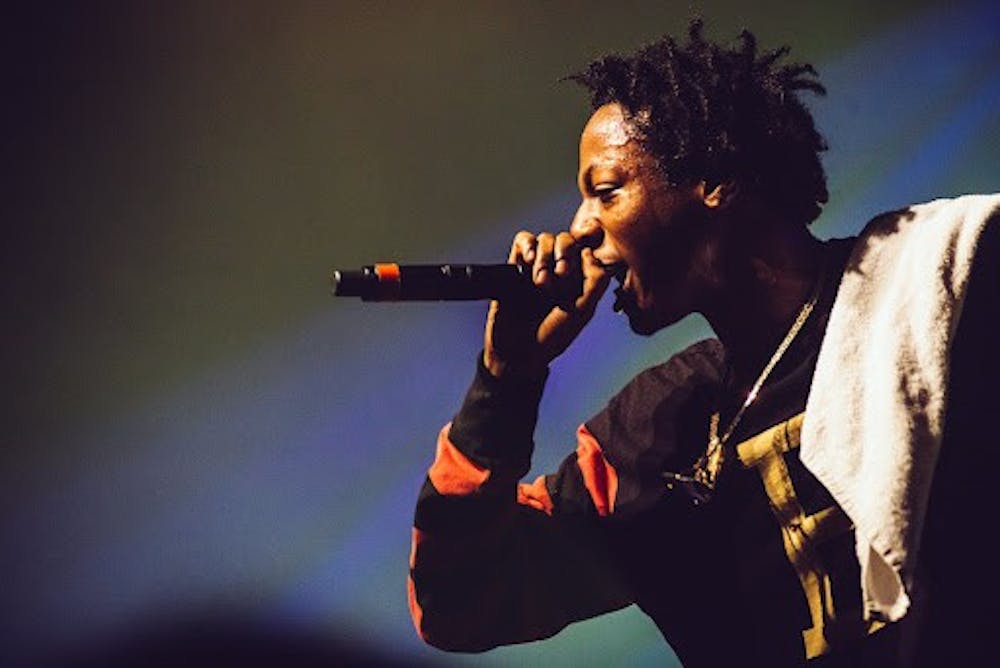Editor's note: This story contains references to Suicide
In the five years since his last full-length album, rapper Joey Bada$$ has lost some of his closest friends, basked in the commercial success of 2017’s “All-Amerikkkan Bada$$” and become a father. Now, Joey Bada$$ is back with “2000,” a project where he attempts to utilize his ever-expanding repertoire of lyrical weaponry while reminiscing upon his decade-long career since the release of his first mixtape.
His trademark buttery-smooth flow and mellow, melodic beats perfectly compliment the deep, introspective lyrics of “2000.” Throughout the album Joey Bada$$ covers topics such as depression and mental health, demonstrating his growing maturity as a lyricist, but at the same time he never shies away from bragging about his commercial success and lavish lifestyle.
In naming his much-hyped new album “2000,” Joey Bada$$ sets an ambitious goal to one-up his debut album, “1999,” which is often viewed as a modern hip hop classic.
Even though “2000” is more of what fans have come to know and love, it inevitably comes up short compared to its predecessor. Unfortunately, Joey Bada$$ can’t seem to break away from “1999” in his new album. The new album’s artwork is incredibly similar to that of “1999,” and there are even instances of bars being transplanted directly into “2000” from his older work.
“One of Us” is one of the best tracks on the album, but it recycles one of the tightest bars on “1999” all the way down to its identical setup. Joey Bada$$ delivers the lyric, “I knock it out the park like Albert Pujols” as the final line in a series of bars all ending with “Pujols” rhymes. Ten years earlier, Joey Bada$$ had already used the exact same setup in “Where It’$ At?” off “1999” to deliver the line “Hit it out-park like Al Pujols.” At the time, Albert Pujols played baseball for the Los Angeles Angels. Couldn’t Joey Bada$$ have at least referenced the Angels’ current slugger Mike Trout as a clever callback to the Pujols line instead of straight-up ripping the Pujols reference from his old song?
Though seemingly inconsequential, the Pujols line on “One of Us” sums up the problem with “2000”: it’s just not “1999.” The constant callbacks to the classic album serve as the new project’s biggest detriment, and by setting up “2000” to compete with “1999,” the album almost feels like a grown man slipping on his letterman jacket to relive his high school glory days.
None of this is to say “2000” is a bad album; in fact, it is up there with Denzel Curry’s “Melt My Eyez See Your Future” as a contender for the best rap album of the year. The structure of the album simply traps it into constant comparisons with “1999,” an album that is simply superior.
After moving past the initial disappointment of his over-reliance on callbacks, as well as the terrible “Welcome Back” featuring Chris Brown, “2000” is still a stellar album that solidifies his spot as one of the best rappers in the game.
The album’s opener, “The Baddest,” starts “2000” off on a high note with Joey Bada$$ and guest Diddy offering a tribute to their roots in New York rap. Bringing on Diddy, arguably the living face of 1990s New York hip hop, Joey Bada$$ indirectly suggests that he is ready to take on the torch as the figurehead of his city’s hip hop scene. He even broadens the scope of his self-assuredness by mentioning his own name in the lyrics of the song alongside Kendrick Lamar and J. Cole, two rappers commonly cited as the greatest of the modern generation of rap.
Later in the album, “Brand New 911” packs a welcome jolt of energy into an otherwise laid-back tracklist, and features the album’s best collaborating artist, Westside Gunn.
The single “Survivors Guilt” is probably the best track on the album and serves as a touching tribute to the late Capital Steez, his best friend who featured heavily in his past work. Capital Steez took his own life just months after “1999” released, and Joey Bada$$ delivers a heartfelt message about the importance of mental health and his own process of coping with Steez’s death through the lyrics of “Survivors Guilt”: “You see the truth about Steelo [Capital Steez], he lacked the mental health / But try to tell that to people way back in 2012.”
Overall, “2000” is rife with his signature conscious lyrics tied together by crisp, clean production, and though the album holds itself back by constantly trying to remind the listener of the superior “1999,” it is still an outstanding project that is worth revisiting time and time again.
2000 was released on streaming platforms on July 22.





